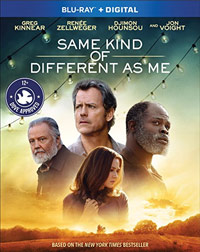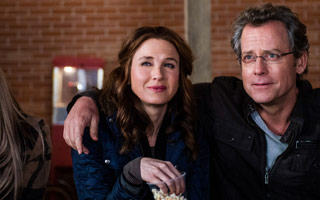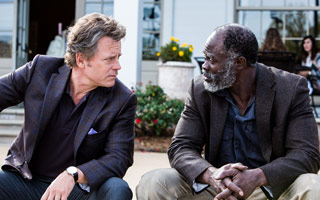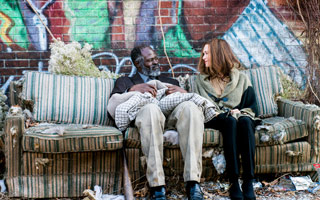

 - for thematic elements including some violence and language.
- for thematic elements including some violence and language.
With more money than they could ever possibly need, Ron and Debbie Hall have everything they could ever want … except for a loving marriage. When Ron’s unfaithfulness is brought to light, Debbie invites him to stay—as long as he remains truthful and does what she asks of him. But when her request includes serving the homeless at an inner-city rescue mission, Ron would prefer to write a large check instead.

Guided by her faith and spurred on by the dream of a homeless man she senses will change their city, Debbie befriends a disenfranchised man named Denver. More surprisingly, so does Ron. Despite vast differences, their lives begin to intersect and they all are changed forever. (from SameKindofDifferentAsMe.com)
My experience with the story of Same Kind of Different as Me began in 2014 when I was invited to visit the filming of the movie on location in Mississippi. I had not heard of the book the film was based on, so I got a hold of the audiobook to quickly familiarize myself with the story before making the trip. The film was finished in the fall of 2014, but release was delayed for three years, waiting for just the right time to be released. Finally, Ron Hall's story of love, forgiveness, loss and unexpected friendship finally releases for the world to see on the big screen.

Same Kind of Different as Me follows the true story of an art dealer named Ron Hall and his experiences with serving the homeless. But the story is filled with gritty examples of the harsh realities of life. This particular story begins with his wife, Debbie, learning of his infidelity. They had grown apart, which led to his own wandering, but it put the couple in a position to decide whether or not they wanted to fight for their marriage or go their separate ways. Shortly after they fight over the revelation of Ron's adulterous ways, Debbie has a vivid dream about a mysterious black man that leaves her puzzled. Soon after this, she drags Ron reluctantly to a soup kitchen to make him help serve the homeless (as part of his reparations for his mistake), when suddenly the man from her dream bursts through the door wielding a baseball bat and violently makes a scene. It's then that she realizes this homeless man, nicknamed "Suicide," was in fact the man in her dream. What unfolds is a unique culture clash as Ron and Debbie go out of their way to get to know this man -- whose real name is Denver -- and it changes their lives forever.

Same Kind of Different as Me isn't your typical Christian or faith-based film. It's nowhere near as dark (or cynical) as something like Blue Like Jazz, but it's hardly fluffy like some Christian films can seem. There's an authenticity to the way faith is portrayed in the film; it's never preachy and it is more just part of the story than the main catalyst for the story. (If you've seen any number of Christian films, you've probably seen one--or more--where the gospel is worked forcefully into scenes, often accompanied by poor acting.) Ron and Debbie were believers at the time that this story takes place, but Debbie's fervor was a bit more intense than Ron's, and she was quicker to venture outside of her comfort zone to do whatever she felt God was calling her to do. And when the Halls stepped out of their comfortable lifestyle to get their hands dirty helping the less fortunate, their world expanded in ways they couldn't imagine. Denver is a complex person, played incredibly and with great intensity by Djimon Hounsou (Guardians of the Galaxy, Gladiator), and his presence gives the film a distinctly unique feel. When we're first introduced to Ron, and then Debbie, it feels like it's a completely different film. It changes drastically once Denver is brought in, and we even learn significant pieces of his backstory through flashback that help flesh out his completely different way of life and upbringing. Race becomes an important theme, but it's not the central one. The story is rich with many layers, and it all works pretty well, thanks to the acting chops of Greg Kinnear, Renee Zellwegger and Hounsou. Through seeing the relationship Hall had with his alcoholic father, played by Jon Voight, you realize that this wealthy white art dealer's life hasn't been a walk in the park either. The core story of the film is really about the lives of Ron and Denver, with how the life of Debbie Hall greatly impacted them both -- and how God used her to change their lives and the lives of others around them. Through Hall's telling of this story, and Michael Carney's direction, there's really a lot to unpack here, and it's tough not to get emotionally invested in this story and the lives of these people. The fact that these were (and are) real people make it all the more impactful too.
It's a tricky thing translating a book into a feature film. It was a wise choice to make the film more so about Hall recalling the story in order to write the book, and I enjoyed seeing those intermittent sequences. The pacing could be a problem for some though, with some slower sequences or drawn-out ones, where it almost edges a little on awkwardness. However, it lends a sense of intimacy to the story, too, allowing us to settle in and get to know these people, who are so wonderfully portrayed by Kinnear, Zellwegger and Hounsou. However, some of the peripheral characters feel a bit like caricatures, especially the two Hall children -- who feel like set dressing more than real people. Their son, who appears in a few scenes, doesn't even have a line in the film. And in one key scene, it feels really odd that he just sits there quietly and doesn't say a word as his mother talks to him. But, thankfully, the outstanding core performances make up for any weak spots along the way.

The movie certainly isn't for everyone. It's first and foremost a drama, and the last act is pretty weighty given its themes. Also, from Denver's baseball-bat swinging introduction to some KKK related flashbacks, there are some serious and brief violent scenes that could surprise a few (especially younger viewers). There's also a significant character death in the story that brings about some serious discussions in the film and a deeper emotional element. As far as other content goes, Ron's cheating on Debbie is only mentioned briefly, with the resulting conversation between the two handling the topic rather delicately. There's also a very brief passionate moment later in the film between Ron and Debbie that implies they sleep together, but, again, it's handled tastefully (and, afterall, they are married). Profanity is limited to about four uses of "hell," mostly in an inoffensive way, and roughly five uses of "n*gger" when Denver is relating stories of racial discrimination from his past. Finally, alcoholism is a heavy theme as we see Ron's father drinking in nearly every one of his scenes and often appearing drunk and slurring his speech.
Same Kind of Different as Me isn't your typical cinematic experience. Aside from being a slower form of storytelling than the average popcorn-munching moviegoer today may be accustomed to, it's a deep and rich story about humanity, social status, faith, love, forgiveness, and sacrifice. It's a beautiful story that'll stick with the viewer long after the credits finish rolling, and something truly inspirational that begs the viewer to get up out of their seat and love someone outside the confines of their own comfort zone.
- John DiBiase (reviewed: 8/10/17)
Love is Patient, Love is Kind - The Making of Same Kind of Different as Me (26:52) - This is a great featurette about how director Michael Carney and author Ron Hall connected to do the movie. It also talks about casting--and how they were able to get their first-choices for a lot of the actors, the filming process, the real people the characters are based on, and filming in Mississippi. We also get some great interview footage of the actors talking about the people and characters they play. (And it doesn't hurt that they included a photo of me alongside other media and Renee Zellwegger from our 2014 set visit! :) )
Filming in Mississippi (10:33) - This shorter featurette focuses solely on filming on-location in Mississippi, renovating a soup kitchen (and leaving it working for the community to use after filming was done!), miracles that happened during the filmmaking process, and cleaning up rundown places they had filmed in to leave them in better shape after they were finished with the production.
Deleted and Extended Scenes (28:27) - There are a staggering 24 deleted or extended scenes, with optional commentary, adding up to almost a half hour of extra footage. Most of these were little moments here and there, but a lot of the later scenes add detail (often painfully) to Debbie's battle with her terminal illness. Here are some details on each scene: The first one is a brief moment where Ron's daughter complains about having to attend his art gala. Next is an awkward moment at breakfast of Debbie with the kids. Her son asks where Ron is but no one says anything (According to the commentary, it takes place after Ron and Debbie's fight; the kids weren't told of their father's affair until after Debbie passed). There's an extended version of Debbie’s dream where she doesn't just see Denver, but sees lots of people walking in a field. There are then a couple scenes where Ron is at his artist friend's home and is working on his book. Those are followed by a short scene where Ron and Debbie drop off a box of old records at the soup kitchen and then they spot Denver walking in the street (*Incidentally, this was the scene I saw being filmed when I visited the set, so I'm excited to see it included here). There's an additional scene when Ron takes Denver to a fancy art gallery and then takes a phone call, leaving Denver alone. He's then approached by security, but Ron returns in time to intervene. It's actually a wonderful moment; I wish they'd left it in (Djimon is fantastic in it, too). It's followed by a tiny additional moment added to Denver's flashback. Next we see Debbie in soup kitchen courtyard where Clara stops by after she’s cleaned herself up. Clara's pimp then visits and starts roughing her up. Denver intervenes and throws him out. The next scene follows it where we see the pimp and one of his girls. Denver then walks up and beats the guy up with his baseball bat and tells him to stay away. It's pretty rough, so I can understand why they cut these two scenes out. Next is an extended scene where Debbie tries to find Denver in a homeless section of the woods. Then there's a short snippet of Denver going outside Ron's house to sleep in the bushes. Next is a series of scenes centered around Debbie's illness. First, Denver is seen sitting and thinking before visiting Debbie at the hospital and kneeling to pray for her. Then we see Ron trying to teach Denver how to drive. The following scene is a moment where Ron and Debbie meet with a doctor and she asks him if he believes in God. There's then a short moment where Debbie and Ron are just sitting in her hospital room doing a crossword puzzle together, and then the next scene shows Debbie in the hospital bed, asking the doctor when she can eat (and her being told she can never eat again because of her illness). The following scene shows Denver picking them up at the hospital, then there's a really heavy scene where Debbie is lying in bed wheezing and Ron is sitting at the foot of her bed with their daughter. In the 20th scene, Ron holds her while she's wheezing in bed and begs her to let go. The following scene takes place much later while he's working on his book and he sees a vision of Debbie walking in the woods nearby. The last three scenes are really short little moments: Ron walking by a painting in progress that shows him sitting outside where he was writing his book, then him coming home to his children, and finally Ron unrolling a painting to find it's the one of him, but now Denver was added to the painting.
- John DiBiase, (reviewed: 2/19/18)
Disclaimer: All reviews are based solely on the opinions of the reviewer. Most reviews are rated on how the reviewer enjoyed the film overall, not exclusively on content. However, if the content really affects the reviewer's opinion and experience of the film, it will definitely affect the reviewer's overall rating.
 Casey J Drops First Album in 6 Years, "The Stories We Sing Vol. 1" Casey J Drops First Album in 6 Years, "The Stories We Sing Vol. 1"Thu, 05 Mar 2026 13:46:00 EST |
 The K-LOVE Fan Awards Returns to Nashville's Opry House May 24 The K-LOVE Fan Awards Returns to Nashville's Opry House May 24Thu, 05 Mar 2026 13:35:00 EST |
 StowTown Records Releases New Album "Rise and Shine" from Sunday Drive StowTown Records Releases New Album "Rise and Shine" from Sunday DriveThu, 05 Mar 2026 13:12:00 EST |
 Mat Kearney Announces "Nothing Left To Lose" 20th Anniversary Tour Mat Kearney Announces "Nothing Left To Lose" 20th Anniversary TourWed, 04 Mar 2026 19:10:00 EST |
 We The Kingdom Celebrates RIAA Gold Certification of "God So Loved" We The Kingdom Celebrates RIAA Gold Certification of "God So Loved"Tue, 03 Mar 2026 18:40:00 EST |
 Mary-Clair Attends Lionsgate's "I Can Only Imagine 2" Premiere Mary-Clair Attends Lionsgate's "I Can Only Imagine 2" PremiereTue, 03 Mar 2026 18:30:00 EST |
 Stand41TrueGod to Release New Single "Wilderness" on All Platforms March 13 Stand41TrueGod to Release New Single "Wilderness" on All Platforms March 13Tue, 03 Mar 2026 18:20:00 EST |
 Click here All News Headlines |
Click here All News Headlines |